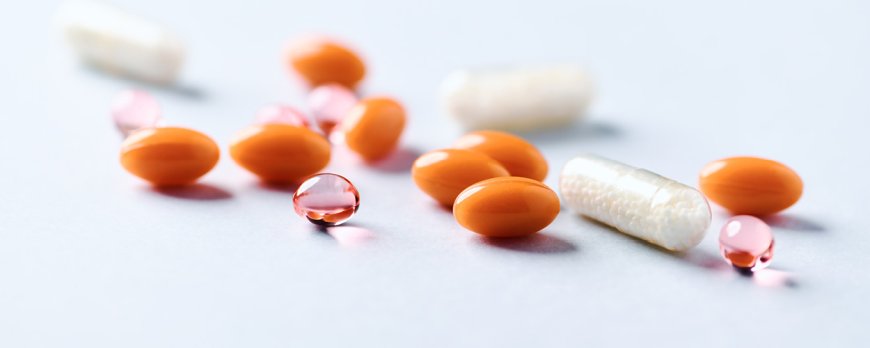CoQ10 and anxiety
Explore the link between CoQ10 and anxiety. Discover how this powerful antioxidant can potentially help reduce anxiety symptoms.

CoQ10 and Anxiety
CoQ10, an antioxidant naturally produced by the body, has been studied for its potential to alleviate symptoms of anxiety. While research on CoQ10 and anxiety is limited, there are several potential ways in which CoQ10 may help with anxiety. It may increase cellular energy, act as an antioxidant, reduce inflammation, and improve blood flow. Animal studies have shown promising results, with CoQ10 reducing anxiety-like behavior and symptoms in mice and rats. Some small human studies have also reported positive effects of CoQ10 on anxiety.
Key Takeaways:
- CoQ10 is an antioxidant naturally produced by the body.
- Research on CoQ10 and anxiety is limited, but it may have potential benefits for anxiety relief.
- CoQ10 has been shown to reduce anxiety-like behavior in animal studies.
- Small human studies have reported positive effects of CoQ10 on anxiety.
- The recommended dosage for anxiety is between 90 to 300 mg per day, divided into 2 or 3 doses.

Understanding CoQ10
CoQ10, also known as coenzyme Q10, is a powerful antioxidant that plays a crucial role in various bodily processes, including energy production and brain health. This compound is naturally produced by the body but can also be obtained through certain foods and supplements. CoQ10 is particularly abundant in organs that require the most energy, such as the heart, liver, and kidneys.
As an antioxidant, CoQ10 helps protect cells from damage caused by harmful free radicals. It also assists in the conversion of food into energy, making it an essential component of the energy production process within cells. Additionally, CoQ10 has been found to support brain health by promoting the efficient functioning of nerve cells and helping to maintain cognitive function.
The Potential Benefits of CoQ10 for Anxiety
While research on the specific effects of CoQ10 on anxiety is limited, there are several potential ways in which this antioxidant may offer benefits. CoQ10 has been found to enhance cellular energy production, which can help support overall mood and well-being. Additionally, its antioxidant properties may help reduce oxidative stress and inflammation, both of which have been linked to anxiety symptoms.
Furthermore, CoQ10 is believed to improve blood flow, which can contribute to a sense of calm and relaxation. Animal studies have shown promising results, with CoQ10 supplementation reducing anxiety-like behavior and symptoms in mice and rats. Small human studies have also reported positive effects, suggesting that CoQ10 may have the potential to alleviate anxiety symptoms in humans as well.
The recommended dosage of CoQ10 for anxiety management typically ranges from 90 to 300 mg per day, divided into two or three doses. However, it is essential to consult with a healthcare provider before starting any new supplement regimen, especially if you are currently taking medications or experiencing anxiety symptoms. While CoQ10 can be used as a complementary approach to support overall mental health, it should not replace standard treatment approaches for anxiety, such as cognitive behavioral therapy or medication.
The Potential Link Between CoQ10 and Anxiety
Research suggests that CoQ10 may help alleviate anxiety symptoms by acting as an antioxidant and improving blood flow, among other mechanisms. As an antioxidant, CoQ10 can neutralize harmful free radicals in the body that contribute to oxidative stress, a condition associated with anxiety and other mental health disorders. By reducing oxidative stress, CoQ10 may help protect the brain from damage and promote overall mental well-being.
In addition to its antioxidant properties, CoQ10 has also been found to improve blood flow. By enhancing circulation, CoQ10 may ensure that the brain receives an adequate supply of oxygen and nutrients, which are essential for optimal brain function. This improved blood flow may help reduce anxiety symptoms, as proper brain function is crucial for maintaining a stable mood and emotional balance.
While the exact mechanisms through which CoQ10 affects anxiety are still not fully understood, these findings suggest that supplementation with CoQ10 may be a promising approach for managing anxiety symptoms. However, it is important to note that more research is needed to establish the effectiveness of CoQ10 in treating anxiety and determine the optimal dosage for anxiety relief.
It is always recommended to consult with a healthcare provider before starting any new supplement regimen, especially if you are currently taking medications or experiencing anxiety symptoms. CoQ10 should not replace standard treatment approaches for anxiety, such as cognitive behavioral therapy or medication, but may be used as a complementary approach to support overall mental health.

Animal Studies on CoQ10 and Anxiety
Animal studies have shown promising results, with CoQ10 demonstrating the potential to reduce anxiety-like behavior and symptoms in mice and rats. These studies provide valuable insights into the potential benefits of CoQ10 for anxiety relief.
In one study, mice that received CoQ10 supplementation exhibited reduced anxiety-like behavior, as observed in various behavioral tests. CoQ10 treatment was found to increase the levels of certain neurotransmitters in the brain, such as serotonin and dopamine, which are known to play a role in mood regulation and anxiety. These findings suggest that CoQ10 may have a positive impact on anxiety symptoms by modulating neurotransmitter activity.
Additionally, research in rats has shown that CoQ10 supplementation can reduce anxiety-related behaviors induced by stressful situations. It was observed that CoQ10 treatment attenuated anxiety-like behavior in rats subjected to stressful conditions, indicating its potential to mitigate the negative effects of stress on mental well-being.
While animal studies provide promising evidence, it is important to note that further research is needed to fully understand the mechanisms through which CoQ10 exerts its anxiolytic effects. Human studies are required to validate the findings observed in animal models and ascertain the effectiveness of CoQ10 for anxiety management in humans. Nonetheless, these animal studies provide a strong foundation for future research in this area of study.
Human Studies on CoQ10 and Anxiety
Although limited, some small human studies have reported positive effects of CoQ10 on anxiety symptoms, providing further support for its potential as a complementary approach for anxiety management. These studies have shown promising results, indicating that CoQ10 supplementation may have a beneficial impact on anxiety levels.
In a study conducted on patients with fibromyalgia, a condition often associated with anxiety, researchers found that CoQ10 supplementation significantly reduced anxiety symptoms. Participants who took CoQ10 reported decreased anxiety levels and improved overall well-being compared to those who received a placebo.
Furthermore, another study investigated the effects of CoQ10 on anxiety in patients with bipolar disorder. The results showed that CoQ10 supplementation led to a reduction in anxiety symptoms and improved mood stability.
While these findings are encouraging, it is important to note that more extensive research is needed to fully understand the potential benefits of CoQ10 for anxiety. Larger-scale studies with diverse populations are necessary to validate these initial observations. Nonetheless, these studies suggest that CoQ10 may hold promise as a complementary approach for managing anxiety.
Recommended Dosage of CoQ10 for Anxiety
When using CoQ10 for anxiety management, it is generally recommended to take a daily dosage between 90 to 300 mg, divided into 2 or 3 doses. This range allows for individual variation and ensures that an adequate amount of CoQ10 is being consumed to potentially address anxiety symptoms.
It is important to note that the dosage may vary depending on factors such as the severity of anxiety, overall health, and any other medications being taken. Consulting with a healthcare provider is crucial to determine the appropriate dosage for each individual's specific needs.
In some cases, a healthcare provider may recommend starting with a lower dosage and gradually increasing it over time to assess tolerance and effectiveness. This approach allows for careful monitoring and adjustment based on individual response.
Potential Side Effects
- CoQ10 is generally considered safe for most individuals when taken at the recommended dosages. However, some individuals may experience mild side effects such as digestive upset, nausea, or diarrhea.
- If any adverse reactions occur while taking CoQ10, it is important to discontinue use and consult a healthcare provider.
- Additionally, individuals who are pregnant, breastfeeding, or have a pre-existing medical condition should consult with their healthcare provider before starting CoQ10 supplementation.
Overall, CoQ10 shows promise as a potential complementary approach for anxiety relief. However, it is important to remember that CoQ10 should not replace standard treatment approaches such as cognitive behavioral therapy or medication. It is always recommended to consult with a healthcare provider before starting any new supplement regimen to ensure optimal safety and effectiveness.

Consultation with a Healthcare Provider
It is crucial to consult a healthcare provider before incorporating CoQ10 or any other natural remedies for anxiety into your routine, especially if you are taking medications or experiencing anxiety symptoms. Your healthcare provider is best positioned to assess your individual needs and provide guidance on the appropriate use of CoQ10 as a complementary approach to anxiety management.
During your consultation, your healthcare provider will consider factors such as your medical history, current medications, and any existing anxiety symptoms. They will be able to determine if CoQ10 is suitable for you and provide information on the recommended dosage.
In addition to discussing CoQ10, your healthcare provider may also explore other treatment options that can work in conjunction with CoQ10 to alleviate anxiety symptoms. Cognitive behavioral therapy, relaxation techniques, lifestyle modifications, and medication may be recommended based on your specific needs.
Remember, while CoQ10 shows promise in helping with anxiety relief, it should not replace standard treatment approaches. It is important to view CoQ10 as a complementary approach, working alongside other therapies and under the guidance of a healthcare professional. By consulting with your healthcare provider, you can ensure that you are making informed decisions about your anxiety management and taking the necessary steps towards improving your overall mental health.
CoQ10 as a Complementary Approach
CoQ10 can be a valuable complementary approach to support overall mental health and alleviate anxiety symptoms, but it should not replace standard treatment approaches such as cognitive behavioral therapy or medication. While research on CoQ10 and anxiety is limited, preliminary studies have shown promising results. Here are some key points to consider:
- Potential Benefits: CoQ10 is an antioxidant that may help increase cellular energy, act as an antioxidant, reduce inflammation, and improve blood flow. These mechanisms could potentially have a positive impact on anxiety symptoms.
- Animal Studies: Animal studies have indicated that CoQ10 supplementation can reduce anxiety-like behavior and symptoms in mice and rats. While these results are encouraging, more research is needed to determine the specific mechanisms and effects in humans.
- Human Studies: Limited human studies have reported positive effects of CoQ10 on anxiety. These studies suggest that CoQ10 supplementation may help alleviate anxiety symptoms, although larger, well-controlled trials are necessary to establish its effectiveness.
It is important to note that the recommended dosage for anxiety is between 90 to 300 mg per day, divided into 2 or 3 doses. However, it is always best to consult with a healthcare provider before starting any new supplement regimen, especially if you are currently taking medications or experiencing anxiety symptoms. Your healthcare provider can provide personalized guidance and assess potential interactions or contraindications.
To summarize, while CoQ10 shows promise as a complementary approach for anxiety relief, it is essential to incorporate it alongside standard treatment approaches such as cognitive behavioral therapy or medication. CoQ10 can support overall mental health and potentially alleviate anxiety symptoms, but it should not replace established treatment strategies. Further research is needed to fully understand the benefits and mechanisms of CoQ10 for anxiety.
The Need for Further Research
While the existing research on CoQ10 and anxiety shows promise, further studies are necessary to fully understand and validate the potential benefits of CoQ10 for anxiety management. The limited research available suggests that CoQ10 may have positive effects on anxiety through its involvement in energy production, antioxidant activity, reduction of inflammation, and improvement of blood flow.
Animal studies have provided encouraging results, demonstrating that CoQ10 supplementation can reduce anxiety-like behavior and symptoms in mice and rats. These findings suggest that CoQ10 may have a similar impact on human anxiety, but more research is needed to ascertain its effectiveness and optimal dosage.

The Potential Benefits of CoQ10 for Anxiety
CoQ10 supplement is believed to potentially alleviate anxiety symptoms by increasing cellular energy, combating oxidative stress, and enhancing overall brain function. However, the current human studies on CoQ10 and anxiety relief are limited and often involve small sample sizes, making it difficult to draw definitive conclusions.
- CoQ10 Dosage: The recommended dosage of CoQ10 for anxiety management typically ranges between 90 to 300 mg per day, divided into 2 or 3 doses. However, individual needs may vary, and it is crucial to consult with a healthcare provider to determine the appropriate dosage for your specific situation.
- Complementary Approach: CoQ10 should not be considered a standalone treatment for anxiety but rather a complementary approach alongside standard treatments like cognitive behavioral therapy or medication. It is essential to work with a healthcare professional to develop a comprehensive and personalized treatment plan.
In conclusion, while there is promising evidence suggesting that CoQ10 may have potential benefits for anxiety management, further research is needed to fully validate its effectiveness and establish clear guidelines regarding its usage. Consulting with a healthcare provider is crucial before starting any new supplements, especially for individuals with pre-existing medical conditions or those currently taking medication. CoQ10 should be seen as a complementary tool to support overall mental health and well-being.
Conclusion
CoQ10 shows promise as a potential natural remedy for anxiety relief, but it should be used in consultation with a healthcare provider and in conjunction with other treatment approaches for optimal results.
Coenzyme Q10, or CoQ10, is an antioxidant that is naturally produced by the body and is involved in important processes such as energy production and brain health. While research on CoQ10 and anxiety is limited, there are several potential ways in which CoQ10 may help with anxiety.
Studies suggest that CoQ10 may increase cellular energy, act as an antioxidant, reduce inflammation, and improve blood flow, all of which may contribute to the alleviation of anxiety symptoms. Animal studies have shown promising results, with CoQ10 reducing anxiety-like behavior and symptoms in mice and rats.
Additionally, some small human studies have reported positive effects of CoQ10 on anxiety. However, it is crucial to consult a healthcare provider before incorporating CoQ10 into your anxiety management regimen, especially if you are currently taking medications or experiencing anxiety symptoms.
It's important to note that CoQ10 should not replace standard treatment approaches for anxiety, such as cognitive behavioral therapy or medication. Instead, it may be used as a complementary approach to support overall mental health.
While CoQ10 shows potential as a natural remedy for anxiety relief, further research is needed to fully validate its benefits. It is imperative to stay informed and seek professional guidance to make the best decisions regarding CoQ10 supplementation for anxiety management.
FAQ
Is there research supporting the use of CoQ10 for anxiety?
While research on CoQ10 and anxiety is limited, some animal and human studies have shown positive effects of CoQ10 on anxiety symptoms.
How does CoQ10 potentially help with anxiety?
CoQ10 may increase cellular energy, act as an antioxidant, reduce inflammation, and improve blood flow, all of which may have positive effects on anxiety.
What dosage of CoQ10 is recommended for anxiety?
The recommended dosage of CoQ10 for anxiety is between 90 to 300 mg per day, divided into 2 or 3 doses.
Is it necessary to consult a healthcare provider before taking CoQ10 for anxiety?
Yes, it is important to consult a healthcare provider before starting CoQ10 supplementation, especially if taking medications or experiencing anxiety symptoms.
Can CoQ10 replace standard treatment approaches for anxiety?
No, CoQ10 should not replace standard treatment approaches, such as cognitive behavioral therapy or medication. It may be used as a complementary approach to support overall mental health.
Is there a need for further research on CoQ10 and anxiety?
Yes, further research is needed to fully validate the benefits of CoQ10 for anxiety and provide more conclusive evidence on its effectiveness as a treatment option.
































































































































